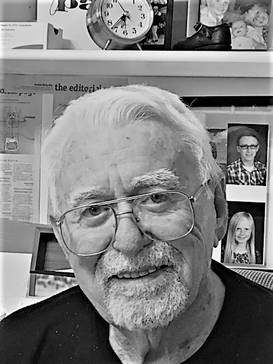 I'm Right Again Dot Com
I'm Right Again Dot Com
An Online Publication of the Anonymous Anything Society — October 24, 2018
Had enough political advertising? I'm going to take a break from things political for the next couple of weeks and repeat things we feel need repeating. Most of The following was first posted on this blog on December 13, 2013 - Phil
SEEKING THE REASON FOR THE INCREASE IN MASS SHOOTINGS
Does anyone wish to argue that the extreme level of violence that pervades all media has nothing to do with the rash of shooting rampages taking place more and more often in America? There is a new normal: individuals who cannot be described more precisely than being "crazy" for seeking their copy-cat desire for 15-minutes of fame.
There once was a time when the motion picture industry policed itself. In 1930, the handful of major studios that controlled the content and private lives of talent in movies realized that the public was repelled by scenes produced in the roaring 20s. Even the private lives of actors was perceived by some segments of society to be immoral...and they were correct. Fame has often proven corrosive to correct behavior..
By 1930, society had become more strait-laced, and there was talk of setting up something like the Federal Communications Commission over movie-making; a politicized agency that would exercise control as exists even today with the FCC. (Cable has yet to have to contend with rules exercised over broadcasting stations.).
The movie industry acted to prevent the sort of control. The studio owners agreed to make former U.S. Postmaster General Will H. Hays, president of their Film Producers and Distributors organization, similar to those adopted by major sports franchises, after baseball was beset by scandals. (1n 1919, eight players for the Chicago White Sox were convicted for betting on the Cincinnati Reds and throwing the 1917 World Series in favor of the Reds.)
The film makers charged Hays with formulating a set of industry guidelines that they would enforce. Hays appointed Joseph Breen, "Administrator. " and was he strict! For example, in the depiction of a scene in which a person was shot, the shooter and the victim were never shown in the same frame. Actors portraying marriage partners could not be seen in the same bed, except when each of them kept one foot on the floor. As a consequence, "twin beds" became the rage all across the USA. Google "Hays Code" to see how far-reaching it became.
All of that ended in 1968, when the film industry adopted the Film Rating system. It's difficult to find a film that doesn't subject one to all of the words and obscenities once forbidden by the old Hays office rules. Nowadays, one is subjected to constant obscenities, most especially the "F-Bomb," in all of its mutations. Sex scenes in almost clinical detail are obligatory, One does not dare take children to a movie without checking the rating.
The most awful violence is designed to engage impressionable young people in virtually lifelike computer "games" where players are conditioned to killing digital enemies and blowing things up. These are addictive to many. Violence breeds more violence.
There is also something unnaturally compelling to unstable personalities in news stories about mass killings.This is known to psychiatrists as "copycat crime." It is also recognized among those who study abnormal behavior in many criminals as "Daddy is finally giving me the attention I deserve."
Of course, we as a people ought to do more than just talk about keeping weapons of all sorts out of the hands of all of those who are mentally incompetent. The manner in which sex offenders are identified in this totally computerized society, though still imperfect, is an example of what is possible as a beginning.
-Phil Richardson, Observer of the Human Condition and Storyteller
"He goes doddering on into his old age, making a public nuisance of himself."—Joseph Menchen
Our unending thanks to Jim Bromley, who programs our Archive of Prior Commentaries
Respond to: k7os@comcast.net